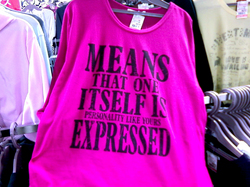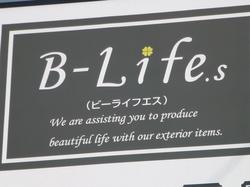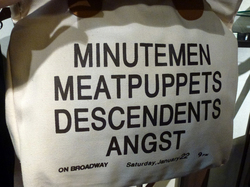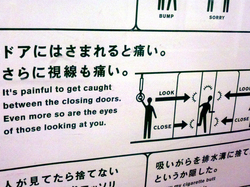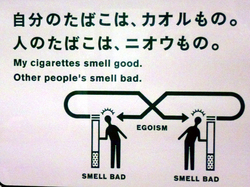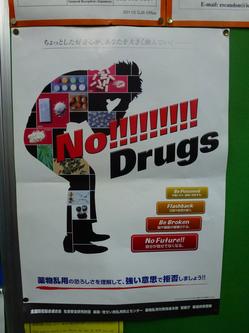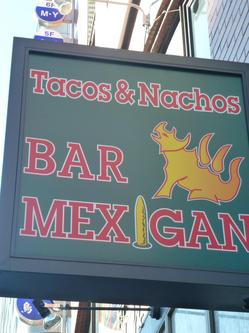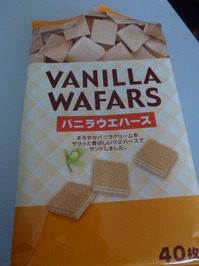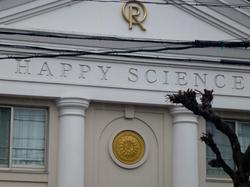One of the things Japan and Asia in general is well-known for is its, to put it mildly, incorrect use of the English language. Call it what you will (Engrish, Japanglish), but over the past 5 or so months, I have definitely see my fair share of the stuff. It’s on shirts, food products, restaurant signs, bags, and even buildings and safety signs.
Is it hysterical? Absolutely. A little unsettling at times? Just about. It’s not even day that you’re riding the train and you see an anti-smoking sign that says “Inhaled. Burned. Thrown away. If it were anything but a cigarette, it would be crying.”
I’m sure there isn’t a concrete reason for just why Engrish is so big here in Japan, but there are certainly a few ideas.
The biggest reason is that English looks cool. It’s the in-thing right now; in songs, movies, daily speechl, you name it. This is why Japanese throw out “Cool!” and “Congratulations!” and “Happy Birthday!” when they can in English, rather than Japanese, because it’s hip. Just as people think it’s sophisticated to use French phrases wherever necessary, or inscribe Chinese characters on something to make it look oriental, so the Japanese stick English on anything to make it seem more modern, and to get unsuspecting Japanese to buy their products without knowing what the mutilated English actually translates to.
Let’s face it, we’ve all look at someone’s Chinese character tattoo and thought it was pretty neat. Even if it could have potentially just been the kanji for hangover. (Which, coincidentally, is this: 宿醉)
Likewise, despite required English education, many people who read the shop sign that says “Cram Cream” or buy the sweater that says “Kitten. Raze. Quirk. Joke.” think they’re just buying something that is immediately that much cooler because it has English letters.
Another significant and potential reason is trouble with translation. Such as in the signs below for train safety, the English translations are, in fact, direct translations of the Japanese. However, not everything transfers, meaning gets lost, and what English-speakers get to read becomes a bit silly.
Japanese language takes more than a dictionary and google to interpret and understand. Many phrases and words carry symbolism, depth, feeling, and emotion. For example, what is simply the adjective for “sweet” (amai) has also been taken into something beyond. Now, amai is also a phenomenon of “too much love for kids in the family.”
Needless to say, for many of these now Engrish phrases, it’s very likely that many of them started as inspiring, kind, even encouraging Japanese phrases that got lost in translation and become garbled in the discrepancies between Japanese and English grammar. Clearly, expenses are not being put towards proper translators in this field, nor is there anyone to truly point out these mistakes.
This can even be seen in songs, where English phrases are forced into the beat with poor pronunciation, resulting in lyrics such as “more than better than need a girl,” “I’m falling love with you,” and “Go go, go it, go it, go it, go.“
Either way, with the rise of English usage in Japan, it doesn’t look like these signs are going anywhere. In fact, it’s very likely that they’ll go up in time.
Whatever the reason, it doesn’t look like this poor use of English is bothering anyone, and for English-speakers, it’s far more amusing than anything else. I can’t say i’m complaining. As long as I can get my vanilla wafars and enter buildings that are called Happy Science, I’m content.
Location: Nanzan University, Nagoya, Japan
Loading map...




